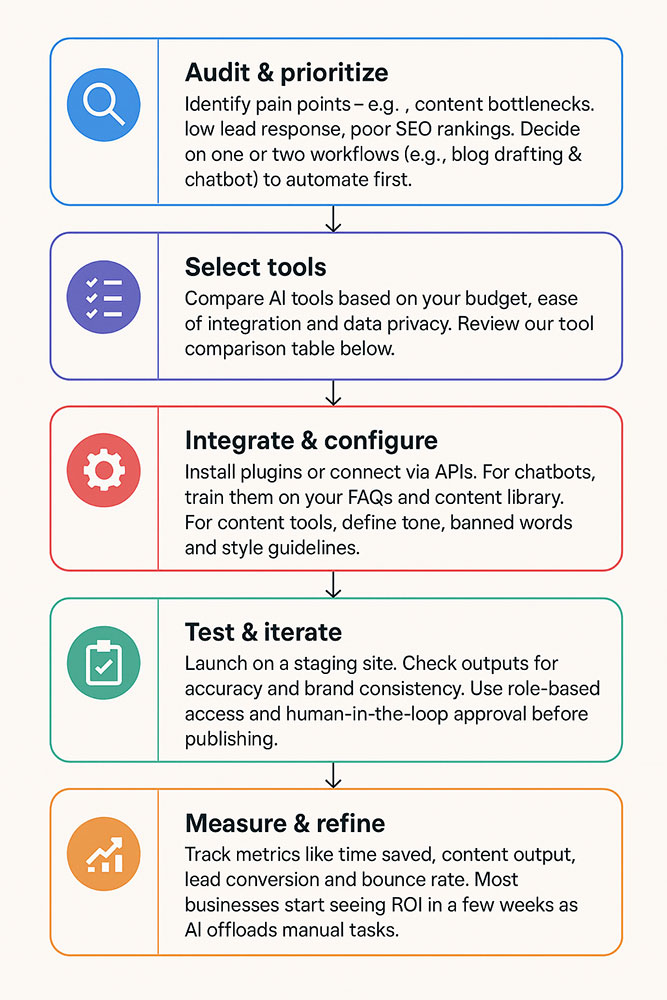
AI for WordPress
Small‑business owners face relentless competition and limited resources. Yet a transformative shift is underway: AI adoption has gone mainstream. 68% of small businesses already use AI, with 9% planning to adopt it within a year, in the U.S., according to Goldman Sachs
The Chamber of Commerce report noted 99 % of SMBs use at least one technology platform, and 44 % use generative AI. The message is clear: AI is no longer optional. It’s a competitive advantage. USChamber
But where do you start? 43.4% of the websites on the internet run on WordPress, according to W3Techs, and its open ecosystem makes it an ideal foundation for building a practical AI stack.
This guide explains how to integrate AI into your WordPress site for SEO, content creation and CRM, using credible statistics and real tools. You’ll also find a step‑by‑step roadmap and a tool comparison table to help you choose the right stack.
Why WordPress is the right foundation
WordPress’s dominance isn’t accidental—it’s flexible, extensible and community‑driven. With 78 % of companies using AI in at least one business function, the platform’s vast plugin ecosystem offers ready‑made AI integrations, from Stanford HAI, as cited in recent industry roundups.
Plugins like Jetpack AI Assistant, Elementor AI, Rank Math Content AI and Yoast AI Optimize bring generative text, image creation and SEO suggestions directly into your editor.
WordPress also makes it easy to connect to external AI services via APIs—whether you want to call OpenAI for custom prompts or feed data into your CRM.
Key reasons to start with WordPress
- Market share & support: Running 43 % of sites means abundant tutorials, integrations and talent.
- Flexible plugin architecture: Thousands of plugins and themes integrate seamlessly with AI tools and APIs.
- Open source control: You own your data and can fine‑tune or build custom AI solutions.
Community momentum: With multiple AI‑powered tools released in 2024–2025, the ecosystem is moving quickly.
AI for SEO: rank faster & smarter
Search engine optimization has always required manual research, on‑page tweaks and constant iteration. AI can handle much of this heavy lifting:
- Keyword research & clustering: AI‑powered tools analyze search intent, group keywords into topics and even predict how competitive they are. Plugins like Rank Math Content AI or services like Surfer AI generate keyword clusters and headings automatically.
- On‑page optimization: AI can scan your posts for missing alt tags, suggest internal links, and craft SEO‑friendly meta descriptions. Yoast AI Optimize offers real‑time suggestions as you type.
Technical audits: AI bots crawl your site, identify broken links, slow pages and security issues, and recommend fixes.
AI for content: ideation, drafting & multimedia
Content creation is resource‑intensive. AI can help you ideate, draft and design content faster without sacrificing quality.
Generative text
Plugins like Jetpack AI Assistant and Elementor AI let you ask for blog outlines, rewrite paragraphs, or expand bullet points into full sections. Use them to break writer’s block, but always edit for tone and accuracy.
AI imagery and multimedia
Generative image tools (e.g., DALL·E, MidJourney) produce custom visuals. WordPress plugins such as Media AI can suggest relevant stock images or auto‑generate featured images. Video AI tools like Pictory convert articles into short videos for social media.
Voice & chat
Voice bots can narrate your blog posts. AI chat tools like Intercom AI create user‑friendly chat flows that extend content into conversations.
AI for CRM & personalization

A significant opportunity for small businesses is using AI to turn a WordPress site into a reliable lead-generation engine.
Start with chatbots and virtual assistants that handle FAQs, qualify visitors, and book appointments around the clock—according to the C_TEC report, 44% of small businesses already use generative-AI chatbots for customer interactions, and tools like Tidio AI plug into WordPress in minutes.
Deeper in the funnel, AI-powered CRMs score and segment leads by behavior, enabling sales teams to focus on those with the highest intent. Platforms like HubSpot AI and Salesforce Einstein go a step further, predicting conversion likelihood.
Finally, AI-driven personalization recommends products, surfaces the right content, and times offers, lifting engagement and lifetime value. Together, these pieces automate the busywork while improving speed-to-lead and conversion quality.
- Chatbots & virtual assistants: AI chatbots answer FAQs, qualify leads and book appointments. Tools like Tidio AI integrate with WordPress to provide 24/7 live chat.
- Lead scoring & segmentation: AI CRM tools analyze visitor behavior to score leads and prioritize follow‑ups. HubSpot AI and Salesforce Einstein use machine learning to predict conversion likelihood.
- Personalization & recommendations: AI can tailor product recommendations, content suggestions, and offers based on user data. This drives better engagement and higher lifetime value.

Tool comparison table
| Category | Example Tools/Plugins | Key Tasks |
| SEO | Rank Math Content AI, Yoast AI Optimize | Keyword clusters, meta descriptions, internal linking |
| Content Generation | Jetpack AI Assistant, Elementor AI | Outlines, drafting, rewriting |
| Image & Video | Media AI, DALL·E, Pictory | Auto‑featured images, blog-to-video |
| Chatbots | Tidio AI, Intercom AI | FAQs, lead qualification |
| CRM & Analytics | HubSpot AI, Salesforce Einstein | Lead scoring, predictive analysis |
FAQs
A: No. Many AI plugins require no coding. However, for advanced features, hiring a developer or agency can accelerate the process.
A: AI automates repetitive tasks—research, drafting, and routing—so your team can focus on strategy and creativity.
A: Costs vary widely. Some plugins are free or <$30/month; enterprise CRM AI tools charge per user or per query. Start with free trials
A: Choose tools with clear policies on data usage. Avoid sending sensitive personal data to AI models. Use role‑based access and log outputs.
Conclusion & next steps
AI adoption among small businesses is accelerating—recent national surveys show widespread use of AI and core digital tools across the SMB sector (see the U.S. Chamber of Commerce C_TEC small-business tech adoption report) and growing momentum in owner surveys (e.g., Goldman Sachs 10,000 Small Businesses Voices).
With WordPress as your foundation, you can integrate AI for SEO, content, and CRM quickly and cost-effectively. Plugins such as Jetpack (AI Assistant), Elementor (Elementor AI), Rank Math SEO, HubSpot – CRM, Email, Live Chat, and Tidio Live Chat bring powerful capabilities to non-technical teams right inside the editor.
Follow the implementation roadmap—audit, select, integrate, test, and measure—to build an AI-enabled stack that scales as your needs grow.
